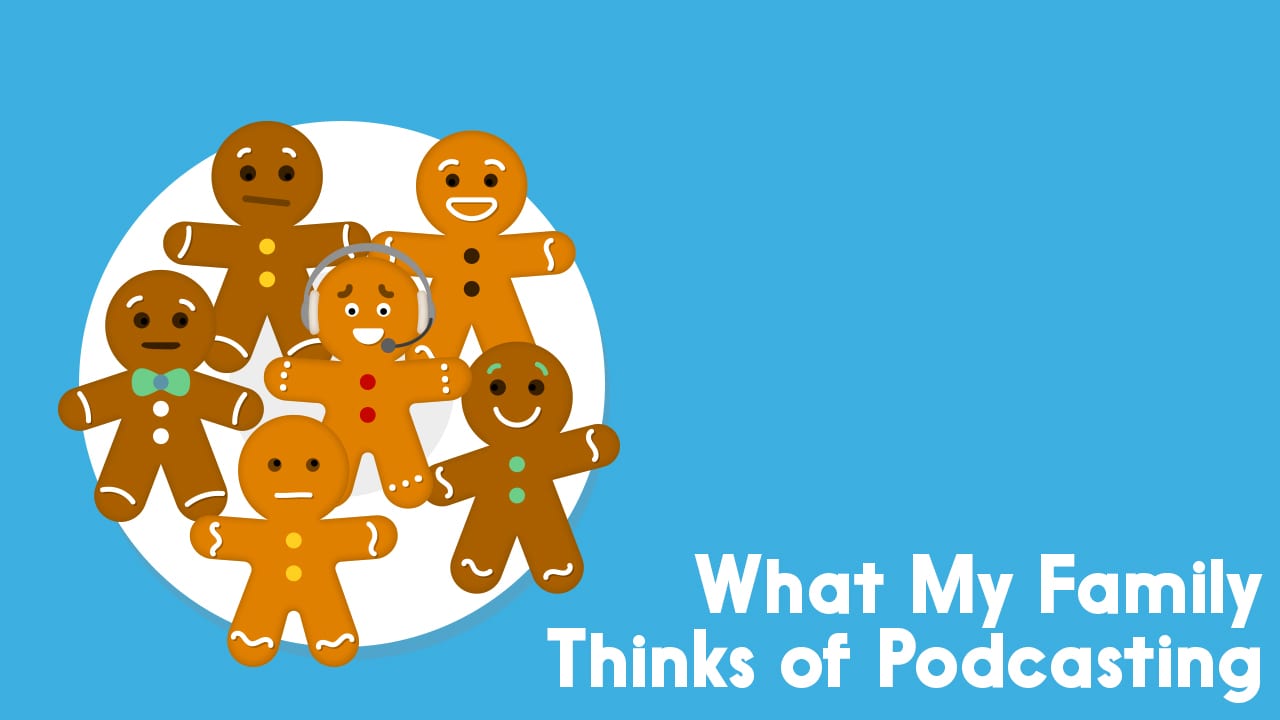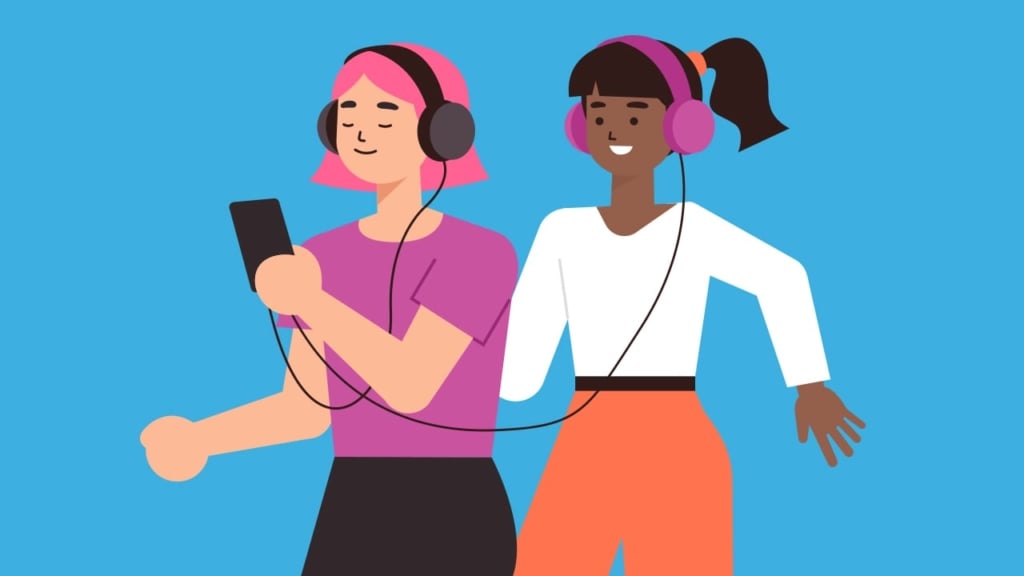What My Family Thinks of Podcasting

According to Know Your Meme, the “what people think I do/what I really do” meme peaked in terms of search interest in 2011. It’s endured since, and searches for it or sharing it are on the rise again. Should you care what people think about your podcasting habit? Yes, in that you want your podcast to have a positive impact, and no, in that you want to commit to your own unique goal. But, your family isn’t just “people.” Your family’s views on how you spend a significant portion of your time and energy is important. How your family expresses those views can affect how much you stick to it. Balancing family and podcasting doesn’t have to strain both.
Let’s look at some different mindsets that people in your family might have, and discuss strategies for coping with each.
The “I don’t get it” family member
This person probably calls your podcast “your podthing” or your “radio show.” More than likely, they have never listened to a podcast, and don’t know how.
If they don’t want to learn, don’t bother. Do you know how many psychiatrists does it take to change a lightbulb? Only one, but the lightbulb has to want to change.
If they do want to learn, great. Figure out what kind of device they’re most likely to use, and show them how to listen. Better yet, listen with them: set up a Bluetooth speaker and make it social.
For relatives you don’t see often, QR codes are your friend. My mom carries one of my podcast’s business cards in her wallet with a QR code on it. She shows it to her friends and lets them scan the code with their phones, so they can see my podcast’s website.
If your podcast isn’t ready to launch yet, make them a playlist of shows you think they might enjoy. This way they learn more about what you’re trying to accomplish.
Some people who don’t consider themselves internet savvy will still use YouTube, because it’s embedded in social media. For these kinds of folks, consider using YouTube as another outlet for your podcast.
Whatever your podcast is about, your family may be interested in that topic. Discussing that topic with them might give you new research avenues and episode ideas.
The “Reckless Cheerleader” Family Member
At first, this family member can seem like the best thing in the world. Early in your podcasting life, they are. Everyone needs someone to say “Go! Go! You can do it!” Sometimes, this cheerleader is a peppy version of “I don’t get it.”
In the long run, this person can be hard to trust. If they see your work through rose-colored glasses, they can’t understand what your challenges and needs as a podcaster are.
Love and nurture these folks, and listen to more podcasts with them. They’re encouraging you because they love you. Don’t ask them for specific feedback, or decision advice. Let them encourage you and thank them. They can also talk up your podcast to others.

The Unintentional Underminer Family Member
They come into your workspace while you’re editing and ask you what’s for dinner, or start vacuuming, or need to show you their newest LEGO build right now. They can’t understand why this is so important to you, or why it’s more important than something else. In the case of kids, this is particularly difficult.
These people are actually great, because they can make you structure your work. For example, if you’re dealing with kids, you can say, “Mommy needs to edit her episode from 2 to 4 on Saturdays, but we will definitely have LEGO time from 4:30 to 5.” With adults, you can say, “I need to finish editing this from 2 to 4. Let’s make decisions about dinner or do the vacuuming at another time.”
Then, USE THAT TIME, like it’s the last thing you’ll ever do. Turn off all notifications, block social media, put your headphones on, make a list and cross things off. Keep your gear organized as well, whether mics and mixers or notebooks and research materials. You don’t need to waste time searching for your notes, or replacing a cable that the puppy chewed.
If you don’t have a room where you can shut the door and keep your podcasting life separate from others, set boundaries around your gear, space and time. Keep your gear in one box or storage bin, have a chair or space where you can work with headphones on, set a timer if necessary.
Unintentional Underminers will be proud when they see the results of your work. Make sure they see it, and know why it’s important. “A person in a completely different part of the world listened to something I made and found it interesting enough to write a review of it.” That’s not nothing. A child who grows up with family members who set goals and reach them, benefits in the long run.
The Intentional Underminer
I am not a psychologist, nor do I pretend to be. However, I read a lot of advice columns.
The Intentional Underminer can behave in ways that are similar to the Unintentional Underminer, so the tactics mentioned previously are still useful. Make boundaries around your resources, and use them.
Gaslighters will try to convince you of things which aren’t true, such as:
- They know more than you do about what you’re doing (whatever. Get informed about podcasting, smile and nod, and commit to your podcast).
- What you’re doing isn’t important or interesting (again: whatever. To them, maybe. We all have different definitions of what’s important).
- “Oh, was that yours? I didn’t know!” Again, set boundaries around your podcasting resources. Keep your gear organized and put away, and set expectations about your time in advance.
Does it matter why someone else intentionally undermines your podcasting? Maybe, and maybe not.
They might wish you would involve them in your interests. If you think this person wants you to share your interests with them, try listening to some podcasts with them. Some podcasters let their kids on the mic for occasional announcements or special episodes. Respect your boundaries around your time and work, but generally, once Mom or your kids or whoever sees how complex podcasting is, they’ll gain respect for what you do.
They also might not want to see you succeed. It’s possible that you might be living with people that you wouldn’t usually live with, such as siblings, parents, or soon-to-be-ex-partners. Trying to podcast in a situation where people aren’t getting along is horrible. However, sticking to work that is important to you and makes you feel good about yourself can help you survive a potentially toxic situation until you can get out.
If you feel like you need a back-pocket script for how to respond to someone who is intentionally sabotaging your podcast, I highly recommend Captain Awkward. This blog isn’t about podcasting, but it covers many different aspects of moments when you don’t know how to respond to someone else’s behavior. The archives have tons of resources for Dealing With Difficult People.

The Partner
Some folks are fortunate enough to not only have a supportive family, they have a partner to podcast with them. This has its own risks as well as its benefits. For example:
- Some people don’t like being directed, or don’t respond well to feedback.
- Maybe they make great siblings, parents, roommates or partners, but they’re not good at collaboration.
- Some people are good at podcasting, but have bad social skills (or so I’ve heard).
In whatever case, make sure that there’s a boundary between your podcasting life and your relationship. Scheduling a balance of podcast time and social time can give you valuable space to be connected, without the pressure of making a podcast, and space to focus on your work.
Family and Podcasting Both Benefit From Boundaries and Respect
Whatever your family thinks about your podcast is less important than how they behave, and how you respond. If they’re supportive, thank them. If they’re not supportive, keep your podcasting separate from them. Treasure and nurture your family relationships, and work on your podcast like the treasure it is.
If you need more information and resources to strengthen your podcasting habits, check out Podcraft Academy. We have tons of courses, downloadable resources, and more, to help you learn all aspects of making and growing a podcast. If you feel technologically challenged, or need some help with polishing your sound, have a look at Alitu, the all-in-one-podcast maker. It’ll give you more time to focus on your content, as well as your relationships.
